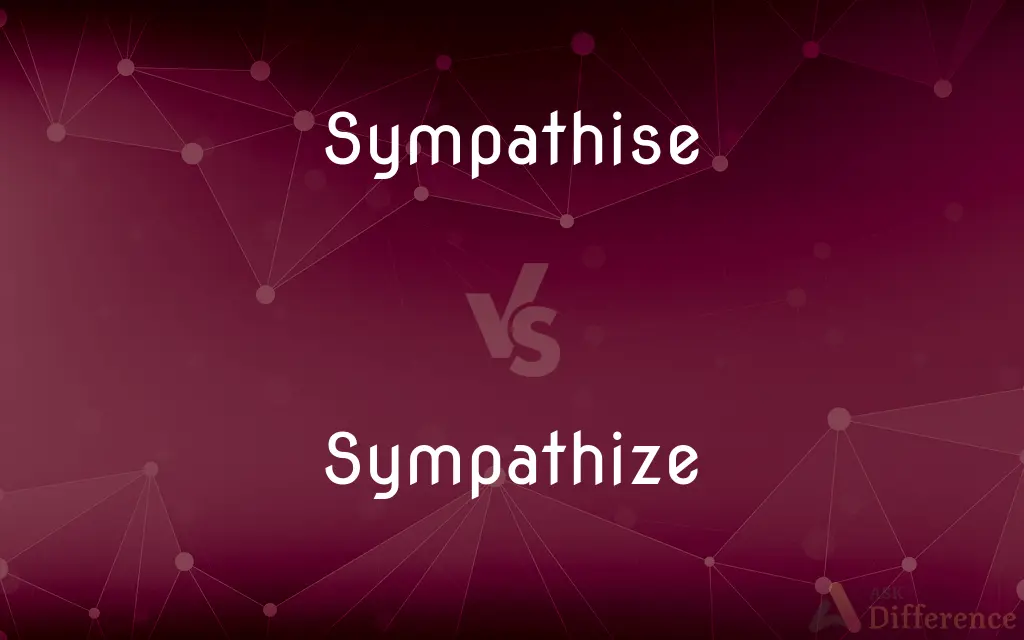Sympathise vs. Sympathize — What's the Difference?
Edited by Tayyaba Rehman — By Urooj Arif — Updated on April 7, 2024
Sympathise is the British English spelling, emphasizing emotional support or agreement with someone. Sympathize is the American English version, carrying the same meaning of sharing or understanding feelings.

Difference Between Sympathise and Sympathize
Table of Contents
ADVERTISEMENT
Key Differences
Sympathise, used primarily in British English, signifies the action of sharing or understanding someone else's feelings, often conveying a sense of compassion or support for another's situation. Conversely, sympathize is the spelling preferred in American English, reflecting the same emotional connection or agreement with another's feelings or circumstances.
The choice between sympathise and sympathize does not affect the fundamental meaning of the word; rather, it reflects regional spelling preferences. British English often includes the "s" in words where American English uses a "z", indicative of the broader differences between these two versions of the English language.
In literature and formal writing, authors and editors choose sympathise or sympathize based on the intended audience's regional language norms, ensuring consistency with other regional spellings. For instance, British publications opt for sympathise, while American publications use sympathize, aligning with their respective linguistic conventions.
The usage of sympathise vs. sympathize extends beyond simple spelling differences, as it can also influence pronunciation slightly, with the primary distinction remaining in the written form. Regardless of spelling, both terms are used to express a connection and shared understanding between people, often in contexts of compassion, support, and emotional resonance.
Both forms of the word are derived from the Greek "sympatheia," combining "syn" (together) and "pathos" (feeling), highlighting the universality of the concept across English-speaking cultures. Whether using sympathise or sympathize, the emphasis is on the emotional and empathetic bond that one person can feel towards another.
ADVERTISEMENT
Comparison Chart
Spelling
Uses "s"
Uses "z"
Usage
Preferred in the UK and other Commonwealth countries
Preferred in the United States
Meaning
Sharing or understanding someone's feelings
Sharing or understanding someone's feelings
Literary Consistency
Aligns with British spelling norms
Aligns with American spelling norms
Pronunciation
Similar, with slight regional variations
Similar, with slight regional variations
Compare with Definitions
Sympathise
To share in the feelings of another, especially in sorrow or trouble.
I really sympathise with what you're going through.
Sympathize
To feel or express sympathy or compassion towards someone.
She sympathized with their struggle and offered to help.
Sympathise
Understanding and sharing another's emotions or experiences.
He found it easy to sympathise with the characters in the novel.
Sympathize
To be in agreement with a particular belief or opinion.
They sympathize with the movement's aims and objectives.
Sympathise
The act of agreeing with or supporting a sentiment or idea.
I sympathise with your concerns about the project.
Sympathize
Sharing a common feeling or empathy towards someone's situation.
He always sympathized with the underdog.
Sympathise
To express compassion or support for someone's situation.
As someone who has experienced loss, I sympathise deeply with you.
Sympathize
To support someone emotionally during a difficult time.
We sympathize with the victims of the disaster.
Sympathise
To be in harmony or agreement in feeling.
We all sympathise with the goals of the charity.
Sympathize
Agreement or accord in feelings, especially pity or compassion.
I sympathize with your views on this issue.
Sympathise
Standard spelling of sympathize
Sympathize
To feel or express compassion, as for another's suffering; commiserate.
Sympathise
Share the feelings of; understand the sentiments of
Sympathize
To share or understand the feelings or ideas of another
Sympathized with the goals of the committee.
Sympathise
To feel or express sympathy or compassion
Sympathize
To be in accord; correspond.
Sympathise
Be understanding of;
You don't need to explain--I understand!
Sympathize
(intransitive) To have, show or express sympathy; to be affected by feelings similar to those of another, in consequence of knowing the person to be thus affected.
Sympathize
(intransitive) To support, favour, have sympathy (with a political cause or movement, a side in a conflict / in an action).
Sympathize
(transitive) To say in an expression of sympathy.
Sympathize
(intransitive) To have a common feeling, as of bodily pleasure or pain.
Sympathize
To share (a feeling or experience).
Sympathize
(intransitive) To agree; to be in accord; to harmonize.
Sympathize
To have a common feeling, as of bodily pleasure or pain.
The mind will sympathize so much with the anguish and debility of the body, that it will be too distracted to fix itself in meditation.
Sympathize
To feel in consequence of what another feels; to be affected by feelings similar to those of another, in consequence of knowing the person to be thus affected.
Their countrymen . . . sympathized with their heroes in all their adventures.
Sympathize
To agree; to be in accord; to harmonize.
Sympathize
To experience together.
Sympathize
To ansew to; to correspond to.
Sympathize
Share the feelings of; understand the sentiments of
Sympathize
Be understanding of;
You don't need to explain--I understand!
Sympathize
To feel or express sympathy or compassion
Common Curiosities
Is there a difference in meaning between sympathise and sympathize?
No, the difference is purely in spelling, reflecting the British and American English usage. The meaning remains the same.
Does the difference in spelling affect pronunciation?
The pronunciation is very similar, with only slight variations that might not even be noticeable in casual speech.
How should I decide which spelling to use?
Choose based on the primary audience of your writing. Use "sympathise" for British English readers and "sympathize" for American English readers.
In a global context, which spelling should I use?
If your audience is international, choose the version you are most comfortable with, or that aligns with the style guide you are following.
Why do British English and American English spell it differently?
The spelling differences arise from historical linguistic developments and standardization processes in the UK and the US.
Can both spellings be used interchangeably?
While the meaning is the same, spelling should match the regional language norms of the audience or publication.
Has the preference for one spelling over the other changed over time?
Preferences have remained relatively stable, though global communication and the internet have increased awareness of both forms.
Are there other words with similar British and American spelling differences?
Yes, many words differ between British and American English in this way, such as "realise" vs. "realize" and "organise" vs. "organize".
How do online spell-checkers handle these differences?
Most spell-checkers can be set to either British or American English to accommodate the correct spelling based on user preference.
Can the use of one spelling over the other change the tone of a document?
Not significantly, but consistent use of British or American spellings can contribute to the overall coherence and perceived professionalism of a document.
Do these spelling differences appear in other languages?
English is unique in having such widespread variations like British and American English. Other languages may have dialectical differences, but not to the same extent in standardized writing.
Is one form older than the other?
The forms developed concurrently with the divergence between British and American English, with neither being definitively older.
Will using the "wrong" spelling be considered a mistake?
In most contexts, using the "wrong" regional spelling is a minor issue, but it can be seen as a lack of attention to detail in professional or academic writing.
How do educators teach these differences?
Educators focus on consistency and awareness of the audience, teaching students to recognize and apply the appropriate regional spelling.
Share Your Discovery

Previous Comparison
Servicing vs. Service
Next Comparison
Lilac vs. LavenderAuthor Spotlight
Written by
Urooj ArifUrooj is a skilled content writer at Ask Difference, known for her exceptional ability to simplify complex topics into engaging and informative content. With a passion for research and a flair for clear, concise writing, she consistently delivers articles that resonate with our diverse audience.
Edited by
Tayyaba RehmanTayyaba Rehman is a distinguished writer, currently serving as a primary contributor to askdifference.com. As a researcher in semantics and etymology, Tayyaba's passion for the complexity of languages and their distinctions has found a perfect home on the platform. Tayyaba delves into the intricacies of language, distinguishing between commonly confused words and phrases, thereby providing clarity for readers worldwide.














































